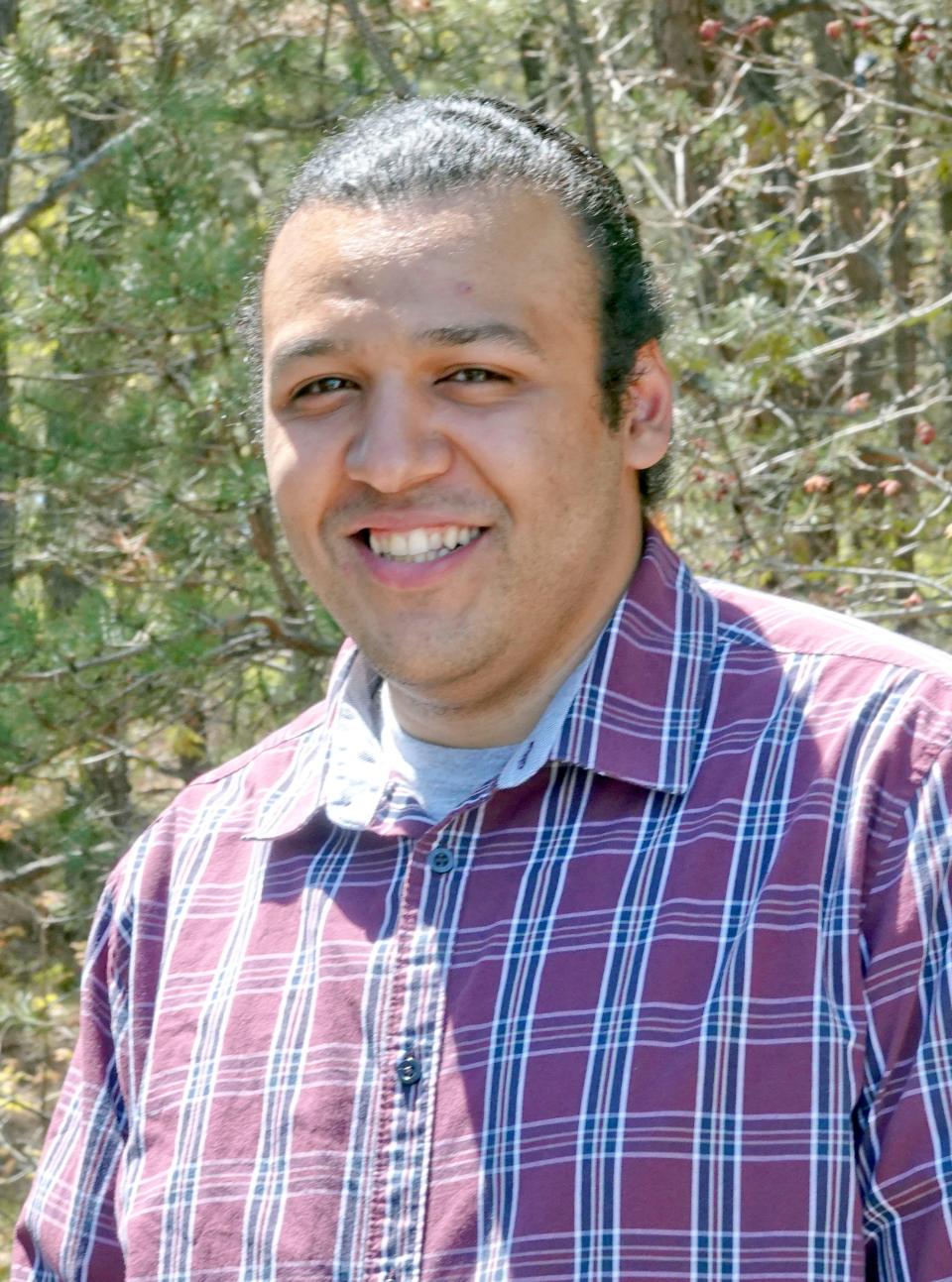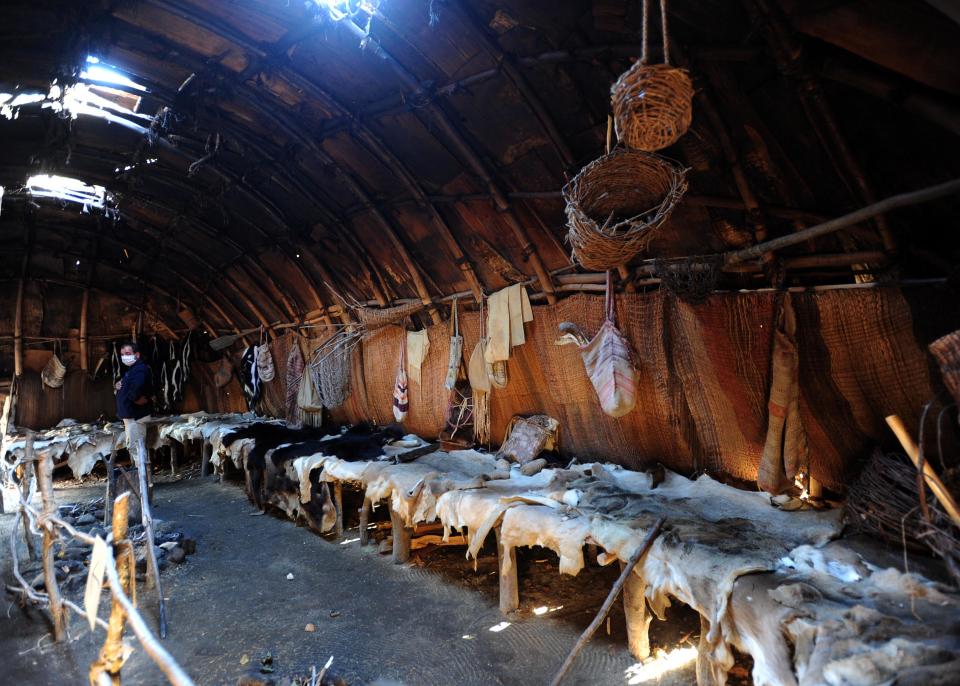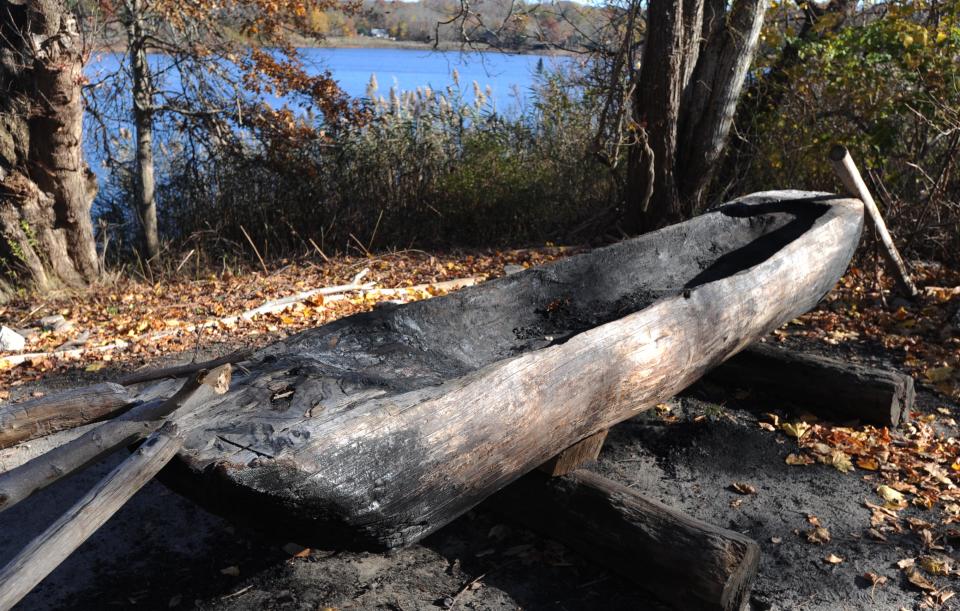Mashpee Wampanoag Tribe chairman faces charges in Plimoth Patuxet Museums theft. What we know
PLYMOUTH — The chairman of the Mashpee Wampanoag Tribe and a Mashpee resident, both of whom face charges in the theft of Wampanoag artifacts from the Plimoth Patuxet Museums, will each be arraigned next month, according to the clerk's office at Plymouth District Court.
The arraignments are set for Jan. 5.
Tribal leader Brian M. Weeden, 30, and Phillip C. Hicks Jr., 30, of Mashpee, face charges of breaking and entering, a felony charge, and larceny over $1,200, Plymouth Police Department spokesman Capt. Jason Higgins said.
Plimoth Patuxet Museums staff noticed Nov. 7 that four items were missing from a wetu — a traditional domed Wampanoag dwelling — in the Native American site area. Two hand-woven bulrush mats and two black bear skins were gone, according to the Plymouth police report obtained by the Times' public records request.

“They put the value on the mats at $5,000, but the sentimental value is priceless,” Higgins said.
Plimoth Patuxet Museums called the stolen items central to its educational mission and "far more than beautiful objects," in a statement issued to the Times on Tuesday by Rob Kluin, Director of Marketing and Communications. Staff harvested the rushes to make the mats and wove them by hand.
"The shocking theft of these objects impacts the Museum deeply because a crime against a cultural institution is always more than any price that can be put on the stolen objects," according to the statement.
The museum remains committed to "continuing our educational mission and bringing public history to life in unique and engaging ways as we work to create the material culture of the Historic Patuxet Homesite and all of our living history exhibits," the statement concluded.
The incident comes months after the Wampanoag tribe severed ties with Plimoth Patuxet Museums, citing the direction of its programs and approach to Native American history. One tribe leader asked Plimoth Patuxet executives to reach out to Wampanoag tribes to consult with tribal leaders, while another leader wanted the museum to stop sharing any aspects of Wampanoag culture.

"They wanted to move in a way where they were making money," Tia Pocknett, a Mashpee Wampanoag Tribe member who once worked at the museum, told the Cape Cod Times for a story published in August. "They wanted to be the Wampanoag Pilgrim Disney."
Police report describes four individuals arriving at the museum employee parking lot
Security footage showed a dark car, described as a Chevrolet Traverse or Equinox, carrying four people pull into the employee parking lot around 2 a.m. on Nov. 7, according to the report. Two men and one woman left the car and walked toward the exhibits, while a fourth man remained in the back seat "presumably acting as a look out."
About 18 minutes later, the three people returned, carrying what looked like the reported missing items in their arms, according to the police report. The car left after the items were loaded in. Cameras were unable to see the registration.
"It appeared these had been specific things the group came for," the police report stated.
A nation created, a nation diminished: Pilgrims’ arrival in Provincetown 400 years ago spawned a clash of cultures
Museum employees identify Weeden from his previous employment, according to police report
Some museum employees positively identified Weeden as the driver, saying he used to work at the museum many years ago.
A staff member told police that "there has been an ongoing problem between the tribe and museum," regarding the hiring of more Native Americans.
"He stated there has not been any recent activity involving Mr. Weeden, but while I spoke with staff, there were reports of tribe members harassing workers as recently as yesterday, the 7th," the report stated.
Adding a new perspective:Plimoth Plantation to change name to include Native Americans
On Nov. 9, a police detective searched for Weeden's name in the state Registry of Motor Vehicles database and found his driver's license photograph "does appear to match the subject that was driving the SUV in the surveillance video." The registry also showed Weeden having a 2011 Chevrolet Traverse registered to him.
The next day, Weeden denied knowing about the theft when contacted by police but said he would come to the department on Nov. 14 to speak with a detective, according to the police report.
Weeden could not be reached for comment on Tuesday.
Police in Mashpee identify Hicks
The Plymouth detective then went to the Mashpee police station, because Weeden lives in Mashpee. A Mashpee police detective identified Hicks, based on a previous interaction.
On Nov. 14, Weeden told police "that he wanted to cooperate in any way he could, however he was going to seek advice from a lawyer first."
Four days later, the Plymouth detective spoke to Raymond Brown and Dan Marx, two lawyers representing Weeden by phone, and discussed the situation and the possible return of the missing items. Later, Brown told police that "although Weeden was working on getting the items returned, Weeden claims that he was not involved in the theft of those items."
Police receive a box containing two bear skin rugs and two woven mats
On Dec. 1, Plymouth police received a box containing two bear skin rugs and two woven mats.
Last Thursday, a museum official confirmed to police the items were the ones taken from the exhibit and said they appeared to be undamaged.
Nonprofit museum seeks to tell story of Pilgrim settlers, Indigenous homeland but conflict has arisen
The nonprofit living history museum, founded in 1947, aims to tell the story of the Pilgrim settlers at Plymouth colony and the Indigenous homeland, according to the website. A winding dirt path leads visitors to the Historic Patuxet Homesite, where there is a hickory bark-covered wetu, a cooking arbor and replicas of customary mishoon canoes.
According to the museum website, the homesite has been open during the summer at the museum since 1971.

Major exhibits at the museum also include a 17th-century English village; the Mayflower II, a replica of the ship that brought the Pilgrims to Plymouth; and Plimoth Grist Mill.
Camille Madison, a Gay Head (Aquinnah) Wampanoag tribal member, previously told the Times that tribal support for the museum has been waning for years but declined sharply after the museum changed its name from Plimoth Plantation to Plimoth Patuxet in June 2020.
Patuxet is an Algonquian word for the area where Mayflower passengers first established a home base in 1620, said Madison, a language teacher at the Mashpee Wampanoag Tribe's Immersion School.
Algonquian refers to a widespread Northeast language group that includes the Wampanoag tribes in southeastern Massachusetts.
The name change, said Madison, was part of the museum's overall promise to expand the museum's Wampanoag Indigenous program and to invest financially in the homesite.
400 years later: What you learned about the ‘first Thanksgiving’ isn’t true. Here’s the real story
Instead, the homesite has fallen into disrepair, and the Wampanoag Indigenous Program was eliminated, she said.
"Plimoth Patuxet is viewed as this wonderfully engaging socially aware organization," she had said. "But we are a community of people saying Plimoth Patuxet is not who they say they are."
Weeden elected in 2021 as chairman of the Mashpee Tribe
In 2021, Weeden, then 28, became the youngest person elected to chairman of the Mashpee Wampanoag Tribe.
Weeden's predecessor, Cedric Cromwell, was convicted in May of soliciting a $10,000 bribe, a Bowflex Revolution home gym, and a weekend stay in a high-end hotel from a Rhode Island architecture firm tasked with managing the tribe's plans to build a resort and casino in Taunton.
Cromwell was sentenced last month at U.S. District Court in Boston to three years in prison.
Reporting from the Old Colony Memorial was used in this report.
Zane Razzaq writes about housing and real estate. Reach her at zrazzaq@capecodonline.com. Follow her on Twitter @zanerazz.
This article originally appeared on Cape Cod Times: Mashpee Wampanoag Tribe Chair faces charges in Plimoth Patuxet Museums theft
